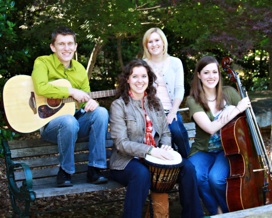Jamie George, MM, MT-BC, Andrew Littlefield, MM, MT-BC, Laurie Peebles, MT-BC, and Andrea Johnson, MT-BC
In this collaborative podcast, the George Center’s music therapy team discusses the benefits of providing performance opportunity for young children with disabilities as well as how to create a successful recreational experience for the entire family.
Resources:
- Beisman, G. (1967). Effect of rhythmic accompaniment upon learning of fundamental motor skills. Research Quarterly, 38, 172-176.
-
Bilhartz, T. D., Bruhn, R. A., & Olson, J. E. (2000). The effect of early music training on child cognitive development. Journal of Applied Developmental Psychology, 20, 615-636.
-
Broh, B. A. (2002). Linking extracurricular programming to academic achievement: Who benefits and why? Sociology of Education, 75, 69-95.
-
Costa-Giomi, E. (1999). The effects of three years of piano instruction on children’s cognitive development. Journal of Research in Music Education, 47(5), 198-212.
-
Koutsoupidou, T., & Hargreaves, D. (2009). An experimental study of the effects of improvisation on the development of children’s creative thinking in music. Psychology of Music, 37(3), 251-278.
-
Orsmond, G. I., & Miller, L. K. (1999). Cognitive, musical, and environmental correlates of early music instruction. Psychology of Music, 27, 18-37.
-
Patel, A. (2009). Music and the Brain. In S. Hallam, I. Cross, & M. Thaut, M. (Eds.) The Oxford Handbook of Psychology of Music (pp. 208-216). Oxford, UK: Oxford University Press.
-
Piro, J. M, & Ortiz, C. (2009). The effect of piano lessons on the vocabulary and verbal sequencing skills of primary grade students. Psychology of Music, 37(3), 325-347.
-
Rauscher, F. H. (2009) The impact of music instruction on other skills. In S. Hallam, I. Cross, & M. Thaut (Eds.). The Oxford Handbook of Psychology of Music (pp. 244-252). Oxford, UK: Oxford University Press.
-
Resnicow, J. E., Salovey, P., & Repp, B. H. (2004). Is recognition of emotion in music performance an aspect of emotional intelligence. Music Perception, 22(1), 145-158.
-
Schellenberg, E. G. (2004). Music lessons enhance IQ. Psychological Science, 15(8), 511-14.
-
Wolff, K. (1979). The non-musical outcomes of music education: A review of the literature. Bulletin of the Council for Research in Music Education, 55, 1-27.

Retrieved from http://www.thegeorgecenter.com/2013/05/22/the-importance-of-performance-opportunities-for-young-children/
About the Authors:
The George Center for Music Therapy, Inc. is a growing music therapy company serving the metro Atlanta area. The five music therapists, primarily working with pediatric patients, strive to provide a creative approach for individual growth. In addition to individual and group music therapy sessions, the George Center for Music Therapy, Inc. offers performing arts classes and adaptive music lessons for children with special needs. Contact: Jamie@TheGeorgeCenter.com
Suggested Citation:
George, J., Littlefield, A., Peebles, L., & Johnson, A. (Authors). (2013, September 1). The importance of performance opportunities for young children during music therapy. Retrieved from www.imagine.musictherapy.biz
Podcast: Play in new window | Download
Subscribe: RSS
